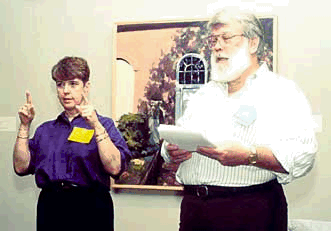Issue: Effective Communication
Common Problem:
City governments often fail to provide qualified interpreters or assistive listening devices for individuals who are deaf or hard of hearing at public events or meetings. In addition, city governments often fail to provide materials in alternate formats (Braille, large print, or audio cassettes) to individuals who are blind or have low vision.
Result:
Individuals who are deaf or hard of hearing are unable to participate in government-sponsored events or public meetings and unable to benefit from city programs and services when they are not provided with appropriate auxiliary aids and services. Likewise, people who are blind or have low vision are unable to benefit from city government services when printed materials are the only means of communication available.
Requirement:
Title II requires that city governments ensure that communications with individuals with disabilities are as effective as communications with others. Thus, city governments must provide appropriate auxiliary aids and services for people with disabilities (e.g., qualified interpreters, notetakers, computer-aided transcription services, assistive listening systems, written materials, audio recordings, computer disks, large print, and Brailled materials) to ensure that individuals with disabilities will be able to participate in the range of city services and programs. City governments must give primary consideration to the type of auxiliary aid or service that an individual with a disability requests. The final decision is the government’s.

A sign language interpreter at a public meeting may be needed to provide effective communication for people who are deaf.
The type of auxiliary aid or service necessary to ensure effective communication will vary in accordance with the length and complexity of the communication involved and the needs of the individual. For example, sign language interpreters are not required for all interactions with people who are deaf or hard of hearing. Employees can often communicate effectively with individuals who are deaf or hard of hearing through standard written materials and exchange of written notes. For simple transactions like paying bills or filing applications, these methods may be sufficient. For more complex or extensive communications, however, such as court hearings, public meetings, and interrogation by police officers, interpreters or assistive listening systems are likely to be necessary.
City governments should ensure that auxiliary aids and services are also provided for individuals who are blind or have low vision. Alternate formats, such as Brailled or large print materials, qualified readers, computer disks, or audio recordings are examples of appropriate auxiliary aids.
City governments are not required to take any actions that will result in a fundamental alteration or in undue financial and administrative burdens. 28 C.F.R. §§ 35.160‒35.164.

User Comments/Questions
Add Comment/Question